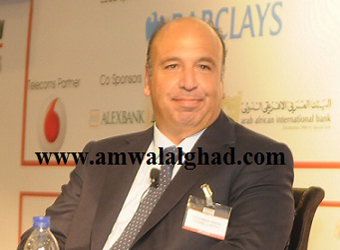Buoyed by prospects for $528 million flushing into its coffers from a planned share sale, Egyptian private equity firm Citadel Capital (CCAP.CA) is looking ahead to a return to profits after years of losses.
For its chairman and founder Ahmed Heikal, the cash inflow represents a fresh start after the company was thrown into crisis by Egypt’s recent political turmoil, having already stumbled in the wake of the 2008 global financial crisis.
“It was the perfect storm of a number of bad factors that hit Egypt, the region and the world. Hopefully we’re past the storm,” Heikal told Reuters in an interview.
The share issue was agreed by Citadel’s shareholders last week, effectively a vote of confidence in the group’s prospects and in Heikal’s turnaround plan.
The group, which has a stock market value of $491 million and whose $9.5 billion under management includes holdings in dozens of companies, mainly in Egypt, east and north Africa, is now able to plot a future path having suffered net losses in the past three years, including a negative 692 million Egyptian pounds ($100 million) in 2012, according to Reuters data.
Citadel is narrowing its focus to energy, transport, agrifoods, mining and cement and plans to gradually divest holdings outside that ambit over the next few years, said Heikal, interviewed in his luxury office overlooking the Nile in an annex to the Four Seasons Hotel.
“I think that by the end of 2014 we should be out of this phase where we have moved everything to be either cashflow positive or on a sustainable basis,” said the 51-year-old chairman, whose ebullient mood perhaps reflected his delight at being about to complete the deal.
“We are slowly going to be on an upcurve, but the upcurve will get faster towards the end of 2016,” said Heikal, whose executive expertise owes its origins to his Phd in engineering management from Stanford University. “If we are correct, at the end of 2016 we will be humming.”
Having set up Citadel in 2004 to follow a classic private equity model of buying stakes in small firms, growing them to be viable then quickly selling them at a profit, the company is adopting a somewhat different approach, under which it will stretch out this timeframe and give Citadel direct ownership of most of the assets.
The success of the rights issue plan is a personal victory for Heikal, one of a handful of senior businessmen maintaining a high profile in Egypt since the uprising that ousted Hosni Mubarak in 2011.
Others resigned, fled the country or are in jail after the uprising turned against a business elite many accused of being corrupt.
BEST OF A TOUGH SITUATION
Having struggled to raise funds or sell assets, Heikal laid the foundations for the rights issue by persuading the backers of companies in which it had invested to accept Citadel shares. He then called a meeting on Oct. 20 of shareholders, who approved the plan.
Citadel will use the funds raised to acquire outstanding shares in those companies, giving an exit of sorts to their investors.
“You can think of it as a swap, in which the limited partners acquire shares in Citadel Capital, and Citadel in turn acquires their shares in select core companies,” Heikal said.
He acknowledged the deal was making the best of a bad situation.
“Whenever people lose money … nobody can be happy given what happened in the world, in Egypt,” he said. “For somebody after that to claim that they are happy … but you have made the best out of a situation that is tough.
“What we have been able to do is achieve liquidity for the co-investors.”
He concedes Citadel’s mistakes in the run-up to the credit crunch, during which time low interest rates led it to become over-involved in start up or “greenfield” companies.
“We probably in retrospect bit off more than what we could chew. So when the crisis hit in 2008, we were open to a lot of greenfields that were partially completed and needed a lot of nursing,” Heikal said.
Looking ahead, some of Citadel’s biggest projects are about to come to fruition, cementing its turnaround.
Projects coming on stream include a $3.7 billion project to upgrade the Egyptian Refining Co (ERC) oil refinery in Cairo and the first phase of Djelfa, a 3.5 million tonne-per-year cement plant it is building in central Algeria.
“Our goal is to be able to complete all the greenfields that we have, to put all companies on a path where they are all cash- flow positive,” Heikal said. “Once we are at this point and once the capital increase is out I think there is room for additional investments in Egypt and in Africa.”


